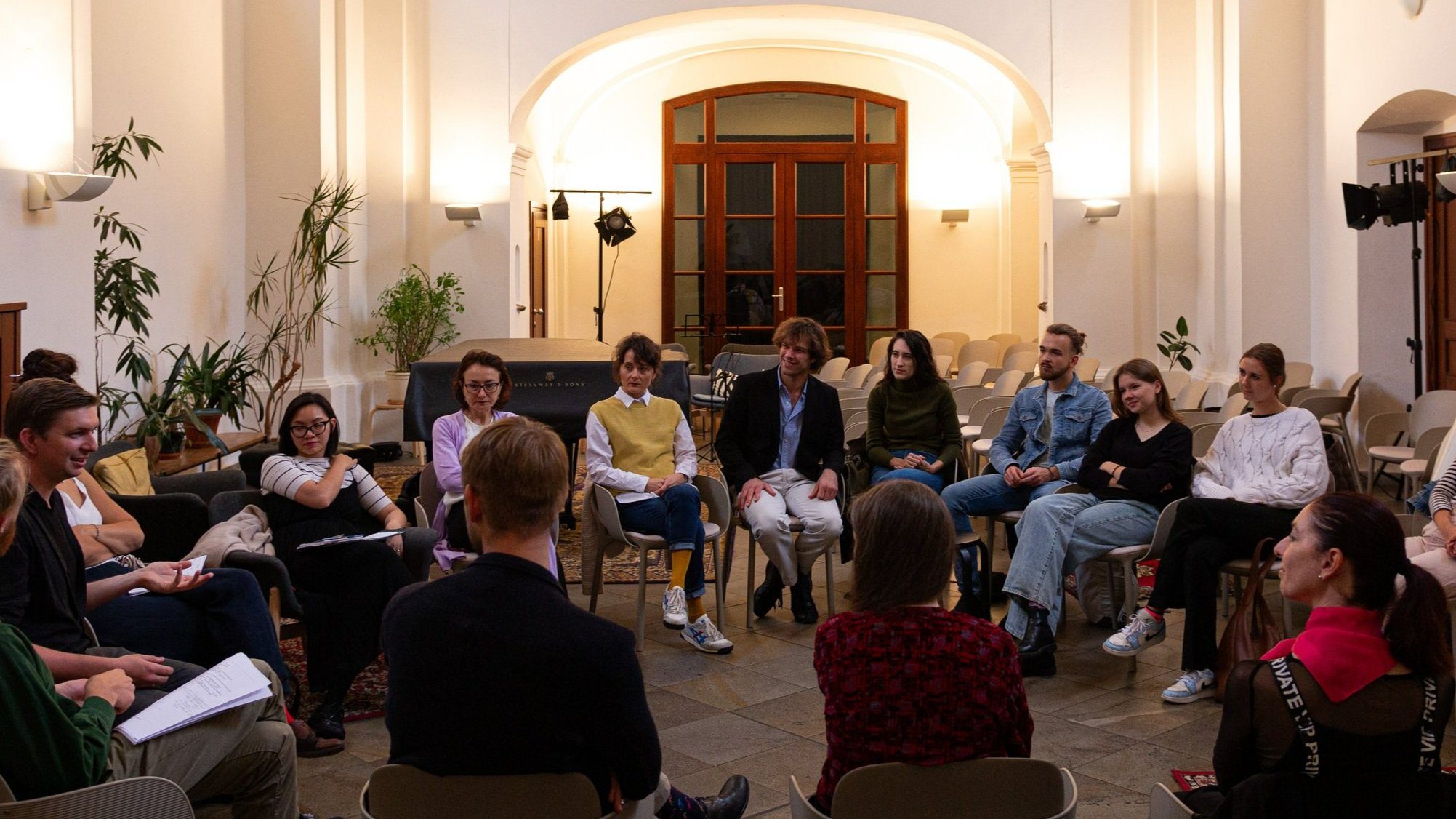
Eco Workshops
Concept
Eco Workshops are specially developed, free sessions for music conservatoires, concert organisers, artist agencies, and ensembles, offering a unique platform for dialogue on sustainability in classical music.
Eco workshops are a group activity designed to:
Give people in classical music a space to talk about the climate crisis.
Make the connection between classical music and the planet more obvious (e.g. without a stable planet, we won’t have a stable music industry; many composers and musicians have been inspired by nature; we need natural materials for our instruments etc.)
Offer organisations in classical music a way of getting involved in the topic of sustainability - by organising an eco-workshop, they are showing that they are trying to find ways of tackling this topic.
Who runs them?
Sam Goldscheider, founder of Harmonic Progression.
A workshop organised in the Atrium cultural center in Prague, September 2024.
© Lívia Valková
“Sam’s workshop was a valuable experience for our team at Askonas Holt, engaging colleagues across all levels of sustainability expertise. His inclusive approach sparked valuable conversations and brought fresh perspectives to our sustainability efforts, inspiring us to think more critically about our priorities going forwards.”
— Donagh Collins
Chief Executive, Askonas Holt & Opus 3 Artists
Where have Eco workshops taken place?
Since the first workshop in July 2023, they have taken place at:
Verbier Festival, Switzerland
Zurich University of the Arts, Switzerland
Askonas Holt, London, UK
IMG Artists, London, UK
Atrium cultural centre, Prague, Czech Republic
Royal College of Music, Stockholm, Sweden
Malmö Academy of Music, Sweden
International School of Brussels, Belgium
Schloss Elmau, Germany
New organisations hosting workshops in 2025 include:
Geneva University of Music, Switzerland
Stanford University Music Department, U.S.A.
Participants discussing a question in their breakout group © Lívia Valková
“Harmonic Progression’s approach of simply asking questions and starting small group discussions on the topics of sustainability and our contribution to helping the planet left me far more aware of the small changes I can make myself to lessen the damage of our carbon footprint on the earth.
What I appreciated most is the way in which Sam and Harmonic Progression go about presenting the information, without judgement or demands, in a way that everyone, presented with the information and motivated by each other's ideas, is actually inspired to take action in their own lives.
I have thoroughly enjoyed Sam’s Eco Workshops and would recommend attending one of them to anyone, especially those that have zero interest or feel that they are completely helpless.”
— Brendan Kane, double bassist
Verbier Festival Chamber Orchestra; Former Principal Bass, Israel Philharmonic; Former Section Bass, the Met Opera
Workshop format
How many people can take part?
Between 10 - 25.
Duration?
Between 90 - 120 minutes, depending on the organisation.
What’s discussed?
Each workshop is designed with the specific group (conservatoire, orchestra, agency, festival etc.,) in mind.
The group will sit around in a circle, with small breakout groups taking place throughout the session.
Worksheets are used to help guide conversations and explore new ideas © Lívia Valková
In order to encourage participants to take part as much as possible in the workshop, small group discussions are crucial and form the backbone of the session. © Lívia Valková
Workshop schedule
The following schedule shows what a workshop designed for a conservatoire could look like:
10h00-10h30 Group discussion 1 - Should the classical music world take action to help the planet? Is it too small to make an impact? Or does it in fact have the potential to inspire millions?
10h30-11h00 Group discussion 2 – Exploring why more is not done. What’s stopping us?
11h00-12h00 Group discussion 3 – What roles can different parts of the classical music world play? Each small group can choose whichever group(s) (e.g. music students, teachers, festivals, agencies, orchestras, opera houses, composers, conductors etc.) to focus on.
80% of participants surveyed found that the workshop helped them:
realise the importance of something as simple as just talking to others in classical music about this topic
feel inspired to spend more time and energy on this topic
find out what some of their colleagues think about this topic
Are you interested in hosting an Eco Workshop?
What does it cost?
The workshop itself is free; we just ask that organisations contribute, if they can and depending on the location, towards travel costs (by train) and/or accommodation costs. This is discussed on a case-by-case basis and in most instances Harmonic Progression can assume these costs if needed. We don’t want a workshop to not take place for financial reasons.
What’s needed?
A room big enough for the group, and 1 chair per person.
Depending on the group, it can be useful to have a projector or interactive screen, but this is not essential.
A positive and feel-good atmosphere is encouraged during workshops
© Lívia Valková
How can an organisation benefit from hosting a workshop?
teambuilding; creating cross-organisational bonds around sustainability
giving its members a chance to voice their opinions on this sensitive topic
showing it cares; devoting time and space to the topic of sustainability
planting seeds; the organisation could be a leader in helping classical music tackle the complicated topic of sustainability
Participants are encouraged to explore and share any thoughts and feelings they have about this topic, in order to allow deeper discussions to take place
© Lívia Valková
Help get more conversation about this topic going and organise a workshop with us
To organise a workshop or if you have any questions, just contact us.
We look forward to seeing you at a workshop!







